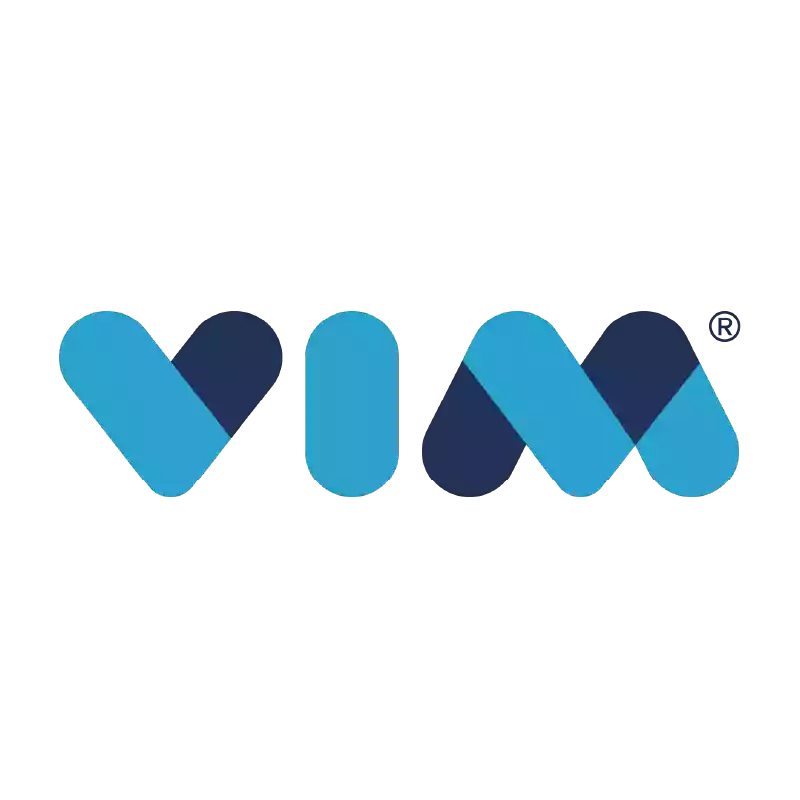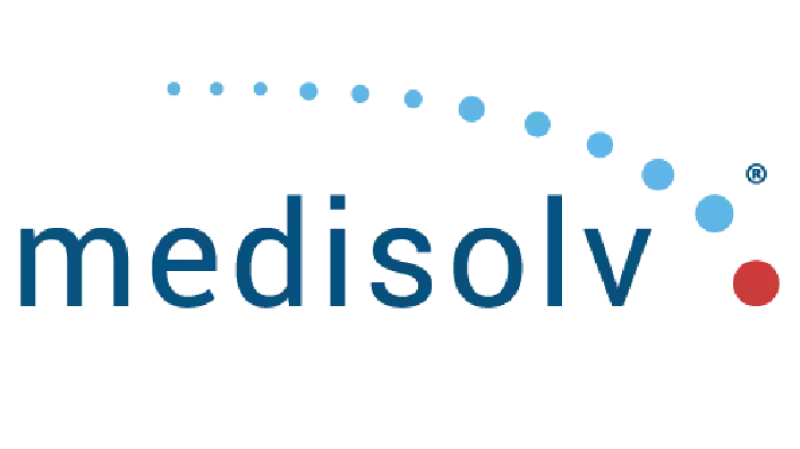Care management software: Overview and 10 options for 2026
Numerous studies have proven that care management interventions lead to better outcomes and improved clinical processes. It’s clear that whole-person care at controlled costs and specific quality thresholds is the best approach to serving patient populations while ensuring operational efficiency. However, complex patient needs, disparate data, and data tracking barriers can throw your organization out of rhythm, resulting in misaligned resources and prematurely cut programs.
This is where care management software comes into play. These tools facilitate an array of care management workflows, such as patient identification and care plan formulation. This article explores this software’s use cases and leading providers, including:
For further guidance in applying data to your care management workflows, watch our webinar: Turn data into decisions: Drive action and increase revenue with real‑time analytics.
What is care management software?
Care management software describes a platform or set of tools used by health organizations to manage and coordinate patient care, including:
Treatment planning
Medication management
Healthcare service coordination
Here is a breakdown of this software’s function and the benefits it brings to the care continuum:
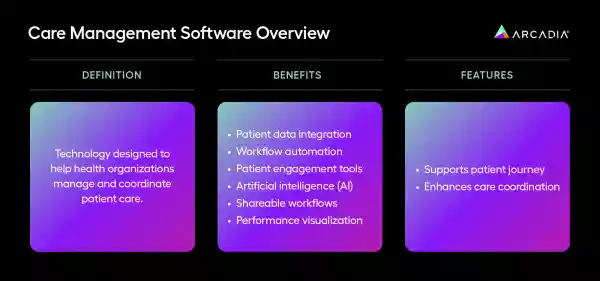
Essential functionalities of care management solutions
Care management platforms provide a simple way for care managers to access an overview of every aspect of care delivery. A robust software solution uses the following features to support increased data aggregation and interoperability:
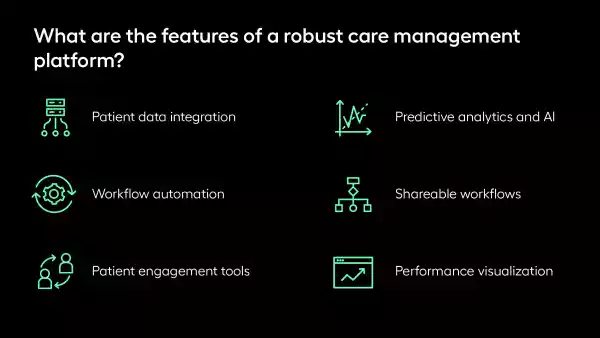
- Patient data integration consolidates medical records, history, and treatment plans into one accessible platform, eliminating data silos.
- Workflow automation streamlines burdensome administrative tasks and clinical processes to keep managers informed and up to date.
- Patient engagement tools facilitate and support ongoing patient-provider interaction, from initial outreach to end-program assessment.
- Predictive analytics and AI analyze historical data to anticipate and prevent negative health outcomes using machine learning.
- Shareable workflows coordinate care between teams, enabling organizations to collaborate with confidence.
- Performance visualization tracks and displays provider performance to aid in clinical improvement efforts.
Care management software saves time and reduces costs with the above features. With continued use, your team can refine its operational efficiency and focus on caring for your patients instead of chasing data points.
Benefits of care management software
Supports the patient journey
Care management software offers a comprehensive framework to support patients throughout their care journey, from initial assessment to ongoing care and outcome evaluation. This includes:
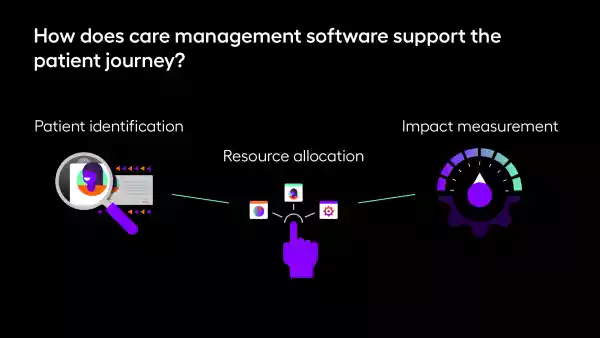
Patient identification: Dig deeper into patient histories to identify and analyze eligible populations. Use specialized tools to pinpoint risk factors and create actionable prevention plans.
Resource allocation: Proactively allocate staff and resources by using the platform to match potential cases to the right managers. Leverage predictive analytics to prioritize the riskiest populations and customize outreach.
Impact measurement: Keep a pulse on your performance with platform case control and retrospective review. As a team, you can then communicate your findings to key stakeholders, schedule automated assessments, and course correct over time.
Enhances care coordination
Payers have a significant impact on member access to care management programs. A reliable provider network is the key to effective care coordination, meaning payers must establish a network of quality providers and incentivize members to leverage appropriate resources. This involves offering financial incentives, employing effective outreach, and even covering care coordination services.
Care management software plays a critical role in this process by:
Improving resource allocation: Analytics tools enable payers to identify high-risk patients, prioritize interventions, and allocate resources accordingly
Enhancing data integration: Care management software makes patient information accessible to the teams that need it, fostering collaboration between payers and providers
Reducing healthcare costs: AI-powered predictive modeling helps payers identify preventable health events, like hospital readmissions, and helps providers intervene proactively
Automating workflows: From patient outreach to decision-making, care management platforms reduce administrative burden by automating repetitive tasks
As a result, these capabilities support payers’ workflows improve the member experience.
Arcadia
As a repeat KLAS award winner and the preferred platform of more than 30% of Newsweek’s 2024 Best Hospitals in the U.S., Arcadia leads the care management software market as the top provider.
Arcadia’s library of care management applications equips teams to effectively manage transitional care, chronic care, and non-clinical care coordination with confidence. These solutions include:
Analytics dashboards: Visualize patient data, share reports with key stakeholders, and evaluate organizational performance using Arcadia’s growing library of healthcare intelligence dashboards.
Patient engagement tools: Leverage AI-enabled patient communication tools to automate critical outreach and engage the populations you serve.
Unified SDoH data: Gain a holistic view of your patients, including information about their lives outside hospital walls. Utilize SDoH data to contextualize patient health and develop a comprehensive treatment plan that drives improved outcomes.
Patient stratification: Identify high-risk patients and intervene swiftly to close care gaps. Arcadia’s Patient Registry equips health teams to assess risk profiles in light of demographic details, cost information, and other relevant factors.
Arcadia enables you to align your team and access the information you need at the point of care. Our robust data set and predictive analytics help guide your team through every step of the care journey, supporting informed and productive action while recouping time and maximizing resources.
Vim
Vim is an integration platform that supplements existing EHR workflows with critical data, insights, and applications. By closing quality gaps, streamlining referrals, and supporting care coordination, this platform enhances care management workflows to improve patient care.
In addition to the platform’s built-in applications, Vim allows users to retrieve data from connected EHRs and deploy custom applications to support their unique workflows.
Medisolv
Medisolv is an analytics platform focused on quality performance monitoring and management. Their CEHRT-certified ENCOR platform relies on advanced analytics to help users assess the quality of care delivery and pinpoint areas for improvement. By providing actionable insights into patient care, Medisolv equips providers to employ targeted interventions and drive improved patient outcomes.
HealthHelper
HealthHelper is a tech-enabled care coordination service that helps providers streamline appointment scheduling, close care gaps, and reduce administrative burden. Through care campaigns tailored to organizations’ specific needs, this partner supports care management workflows by providing care continuity and an unmatched patient experience. HealthHelper is also AI-enabled, allowing clients to access advanced analytics that fuel data-driven strategies.
Athenahealth
Athenahealth is a cloud-based healthcare management service, including EHR integration, revenue cycle management, and population health tools. The platform’s standout features include patient engagement tools, advisory services, care coordination, and telehealth support.
In addition, AthenaPatient mobile services increase care access so patients can log their progress and message care managers on the go.
AssureCare
AssureCare serves payers, providers, pharmacies, and the government to enhance transitional care management, reduce treatment delays, and coordinate with pharmacists. The platform combines utilization management, care management, and medication therapy management for a threefold solution for synchronized care.
AssureCare is known for care coordination, care planning, risk assessment, population health analytics, and tools for patient engagement to support value-based care.
HealthEdge
Health Edge’s care management solution, GuidingCare, is a comprehensive platform for whole-person care that simplifies workflows for both health plans and providers. Its next-generation data integration and workflow management tools facilitate coordination and collaboration, accelerate quality improvement, and promote provider and patient engagement.
GuidingCare specializes in health plan administration and core administrative processing for payers with automated care planning, community referrals, and mobile clinician access.
ShiftCare
ShiftCare zeroes in on home and community-based care management solutions, helping organizations coordinate care to clients in non-institutional settings. The platform’s progress tracking and sharing, accessible care plans, family access, goal tracking, and document management system help care teams meet their goals and establish good relationships.
ShiftCare also includes a mobile app and a dedicated family portal, so all parties can stay informed on the latest care developments.
Helios Care Management
Helios Care Management provides broad spectrum visibility to promote care coordination, collaboration, and value-based care delivery. It is available in different product tiers and configuration levels based on your team’s management needs. With user-friendly point-and-click tools, the platform facilitates more efficient day-to-day use.
Helios’ commitment to security also underpins its software as it has been HITRUST-certified across care, disease, utilization, and population health management tools.
Cognizant Health
Cognizant Health seeks to integrate as many care management processes as possible through its shared CareAdvance and Value-Based Benefits solutions which are both hosted on a member portal. In turn, this automates providers’ authorization and utilization management processes to help lower costs and improve care quality.
Cognizant Health uses touchless operation processing to automate prior authorization processes for providers to get more immediate approvals that meet business requirements and clinical guidelines.
How to choose a care management platform
As you search for the right care management software that fits your needs, there may be several questions you’re juggling — in particular, “How do I know which platform is best for me?” To guide your decision-making, your chosen solution should:
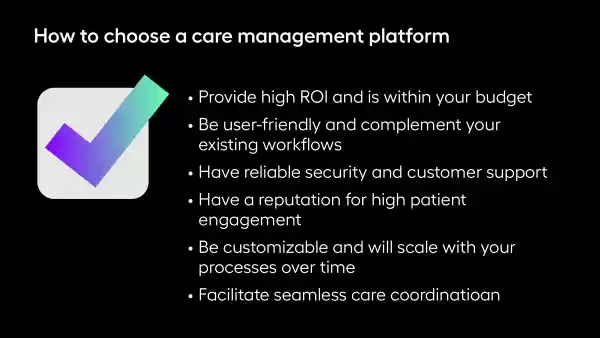
Care management software takeaways
The goal of care management is to facilitate informed and proactive intervention strategies that improve the quality of care. By providing a reliable source of updated measurement information, care management software reduces the risk of misaligned resources and unreliable results. With the help of a robust care management platform, healthcare organizations can count on comprehensive, data-backed support for every patient's journey, from identifying programs to interpreting results.


